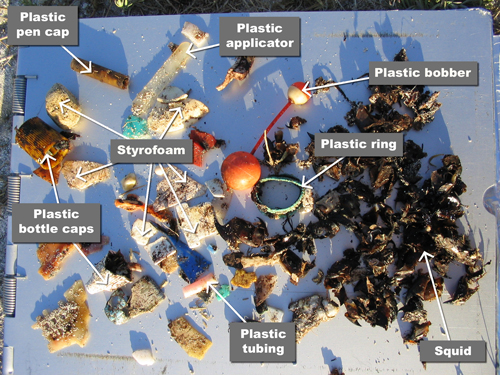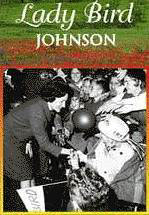|
ONE WORD: PLASTICS
What
the albatross ate.

This is all the plastic debris collected from the stomach of ...
ONE albatross on Midway Island, photographed by
Cynthia Vanderlip -- about 2800 miles WSW of San Francisco, 2200
miles E of Japan, 1200 miles NW of Hawaii. The black objects on
the right are the normal food items -- squid. Clearly half of the
contents of this stomach was human debris, mostly plastics.
Yes,
the problem with plastics really is THIS bad. Read Jean Michel
Cousteau's very compelling essay, "A
Walk Among the Ruins," about what he saw recently in the North
Pacific. Here's an excerpt:
It was the same story on almost every island we
explored during this expedition. Although thousands of miles from
the nearest outpost of civilization, the landscape is littered
with the discarded products of human society: cigarette lighters,
golf balls, glass, rubber, toothbrushes, clothespins...the list
is endless, and dispiriting. I am reminded of the title of a
book by the philosopher, Hannah Arendt: The
Banality of Evil . For these are not ruins
of a heroic age, but middens of a culture of distraction and
disposability. They are mundane, trivial, unnecessary-and fatal.
THIS is what we meant when we titled our slide show "Pristine?" with
a question mark. The travel brochures will try to tell you there
are far and distant seashores untouched by humanity. We don't want
to ruin your dreams, but the time has come to snap out of the fantasy
and realize it is no longer true. The litter -- especially the
plastic debris -- is EVERYWHERE.
 Does anyone remember this woman? Does anyone remember this woman?
In 1965 she made an entire nation wake up and realize the highways
across the country were disgracefully littered. She spearheaded
the "Keep America Beautiful" campaign which lives on
today.
The world's oceans are now like America 's highways once were,
adrift in litter. And the effects on wildlife are shocking.
Captain Charles Moore is one mariner who is hard at work documenting
the extent of the litter in the sea from his research vessel Alguita
supported by the Algalita Marine Research Foundation .
In June, Anna Cummins was aboard for a cruise to Guadalupe Island
off Baja Mexico . She said they examined what was in the stomachs
of 26 Laysan Albatrosses and found that ALL of them had large amounts
of plastic -- from 30 to 60 percent of the contents.
Is this a problem for the birds? Would it be a problem for YOU
to eat 50% plastic? The answer is obviously yes -- the birds end
up feeling full of food when they aren't, which leads eventually
to starvation and death.
You can read a lot about it in Carl Safina's excellent book, "Eye
of the Albatross," in which he tells of watching
an albatross mother regurgitate a green plastic toothbrush as
it tries to feed its chicks.
It is indeed very sad, but "pristine seashore" has become
a contradiction in terms. Give that some thought.
|

